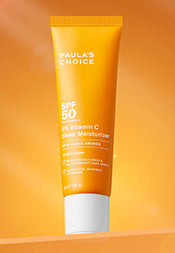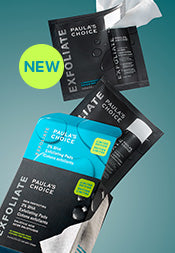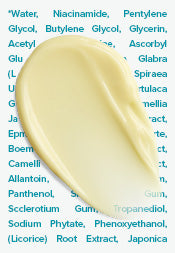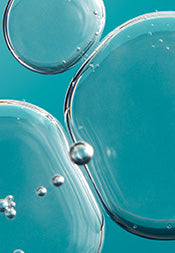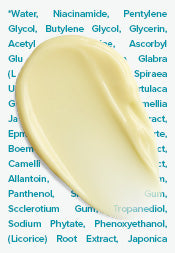How Antioxidants Fight the Signs of Aging
Whether you apply them topically or get them from food, antioxidants play a vital role in supporting healthy, younger-looking skin. In anti-aging skincare, antioxidants help defend against environmental damage — a key factor that contributes to wrinkles, dullness, and other visible signs of aging.
What are Antioxidants for skin?
You might have heard a lot about them but just what are antioxidants and how do they help your skin? At their core, antioxidants are molecules that help protect your body's cells from damage caused by harmful molecules called free radicals. These free radicals are unstable atoms that can damage cells, contributing to aging and various health issues.
In skincare, free radicals are primarily generated by environmental stressors like UV radiation from the sun, pollution, and even blue light exposure. When these stressors hit your skin, they can create oxidative stress, which leads to a breakdown of collagen and elastin, contributing to visible signs of aging such as fine lines, wrinkles, and loss of firmness. Antioxidants work by neutralizing these free radicals, effectively disarming them before they can inflict widespread damage on your skin cells.
Here at Paula’s Choice Skincare, we love antioxidants for your skin because we know they can work to soften the look of fine lines and wrinkles. But there’s more: antioxidants can also help reignite your skin’s vitality, vibrancy, and overall healthy look and feel. And when the best antioxidants are combined in a formula with skin-replenishing and skin-restoring ingredients, they work together to provide optimal results, so your skin looks better than ever.
Benefits of Antioxidants for Skin
Over time, sun exposure, pollution, and other stressors chip away at your skin’s resilience. The result? A duller, less elastic complexion that looks older than it feels.
Antioxidants in skincare products help shield the skin’s surface from further environmental damage. They calm stressed skin and visibly improve skin tone, firmness, and wrinkles.
With consistent use, antioxidant-rich anti-aging products can:
- Visibly reduce fine lines and wrinkles
- Improve uneven tone and rough texture
- Help restore younger-looking skin
Are Natural Antioxidants Ideal for Skin?
There’s no one “magical” antioxidant — and whether they’re natural or lab-derived, effective anti-aging skincare products should include a variety of antioxidants.
While exotic ingredients from rare plants might sound impressive, research shows that several well-known antioxidants are already incredibly effective at protecting skin from damage and signs of aging. For instance, Vitamin C (L-Ascorbic Acid) not only fights free radical damage but plays a crucial role in brightening skin and stimulating collagen production.
Retinoids (including retinol and its derivatives) are another category of highly effective skin-restoring ingredients with significant antioxidant properties. They are renowned for their ability to visibly reduce wrinkles, improve firmness, and refine skin texture by encouraging healthy cell turnover and supporting collagen synthesis.
Niacinamide (Vitamin B3) is a versatile antioxidant that offers multiple benefits. It helps to strengthen the skin's barrier, visibly reduce enlarged pores, improve uneven skin tone, and calm redness, all while defending against environmental aggressors. Other incredibly effective antioxidants include green tea, resveratrol, CoQ10, and glutathione, each bringing unique strengths to a skincare formula.
That’s why Paula’s Choice skincare products, including antioxidant serums, face moisturisers, and broad-spectrum sunscreens, are formulated with a blend of proven antioxidants — both natural and synthetic — for maximum results.
Why Antioxidants in Skincare Need Special Packaging
Antioxidants are powerful—but delicate. Exposure to air and light can quickly degrade them, making them ineffective. To preserve potency, look for anti-aging products packaged in opaque tubes or bottles or air-restrictive pumps or containers with small openings.
Avoid jars or clear packaging, as these allow antioxidants to break down, reducing their benefits before they even touch your skin.
Antioxidants for Your Skin: What Results You Can Expect?
Here’s the honest truth: antioxidants won’t make you look 20 years younger overnight. But when used regularly, they play a key role in supporting firm, radiant, younger-looking skin.
It’s best to think of antioxidants as part of a trifecta of beneficial ingredients you can use in anti-aging skincare products to achieve and maintain visibly firmer, younger looking skin. Antioxidants should be joined by skin-replenishing ingredients like ceramides, hyaluronic acid, and glycerin plus a range of skin-restoring ingredients like retinol, peptides, and niacinamide. Together, these types of ingredients work in harmony to improve skin texture, tone, hydration, and reduce the look of wrinkles.
The trick is to be consistent with your skincare routine and make sure you’re protecting your skin from sun exposure every day with a broad-spectrum sunscreen rated SPF 30 or greater. Sunscreen is your skin’s first line of defense in any anti-aging routine.
References for this information
Free Radical Biology and Medicine, February 2019, pages 399-407
Oxidative Medicine and Cellular Longevity, August 2018, ePublication
Mechanisms of Aging and Development, June 2018, pages 123-130
Frontiers in Pharmacology, April 2018, ePublication
Dermatologic Therapy, May-June 2012, pages 252-259
Dermatology Research and Practice, February 2012, ePublication
Journal of Dermatologic Science, May 2010, pages 85-90


